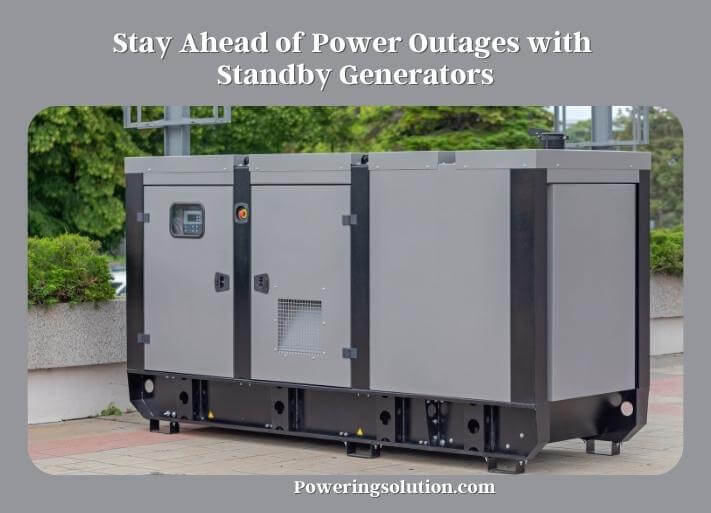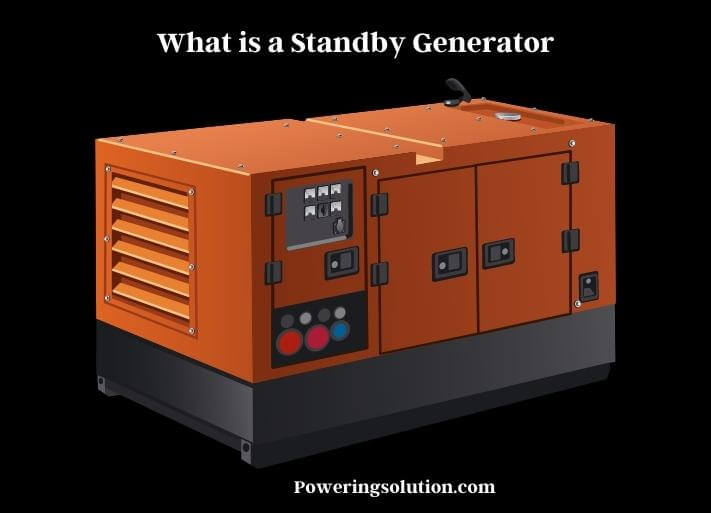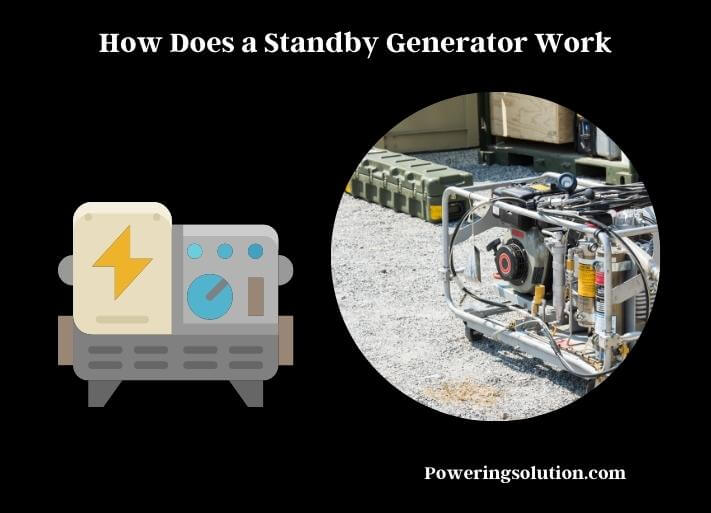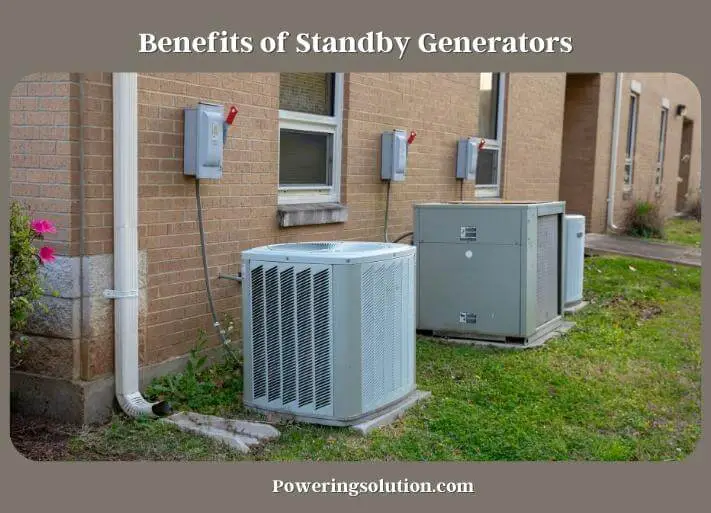Power outages are an unfortunate reality that can disrupt our daily lives and have significant consequences for homes and businesses alike. They can be caused by a variety of factors, such as weather-related incidents, equipment failure, or maintenance issues. The impact of power outages can be particularly severe in situations where essential services are required, such as hospitals, data centers, or emergency response facilities.

Standby generators offer a reliable backup power solution that can help prevent the negative effects of power outages. Our goal is to help you understand how standby generators work and how they can provide peace of mind during unexpected power interruptions.
What is a Standby Generator?
A standby generator is a type of backup power system that is designed to automatically turn on and provide electricity to your home or business during a power outage. Standby generators are typically powered by natural gas or propane and are connected directly to your electrical system to ensure that your home or business remains powered even when the grid goes down.

Standby generators are an important investment for those who want to ensure that they have reliable access to electricity, even during emergencies or power outages.
Understanding Standby Generators
Understanding standby generators is essential when considering backup power solutions for your home or business. A standby generator is a piece of equipment that is permanently installed and connected to your electrical system. It is designed to automatically turn on when it detects a power outage, ensuring that your home or business continues to receive power without any interruption.
Standby generators typically run on natural gas or propane, which means they are capable of providing power for extended periods of time without requiring refueling. They are also designed to provide clean and stable power, which is important for sensitive equipment such as computers, medical equipment, and appliances.
Standby generators have the ability to provide seamless backup power. Unlike portable generators that require manual setup and fueling, standby generators are always ready to go, providing reliable backup power without any intervention from the user. This makes them an ideal choice for homes and businesses that require an uninterrupted power supply.
When selecting a standby generator, it is important to consider the size and power output of the unit. You should also think about the fuel source that is most convenient for your needs, as well as any additional features that may be important to you, such as remote monitoring or automatic self-testing.
How Does a Standby Generator Work?
A standby generator works by automatically turning on and supplying electricity to your home or business during a power outage. Standby generators are connected directly to your electrical system and are powered by either natural gas or propane. When a power outage occurs, the standby generator’s automatic transfer switch senses the interruption in power and signals the generator to turn on.

The generator then begins producing electricity and supplies it to your home or business through the electrical panel. Once power is restored to the grid, the automatic transfer switch senses the return of power and signals the generator to turn off. This ensures that your home or business remains powered even when the grid goes down, providing you with uninterrupted access to electricity.
Standby generators are designed to be reliable, efficient, and easy to use, making them an essential backup power source for those who want to ensure that they are never without electricity, even during emergencies or power outages.
Benefits of Standby Generators
There are numerous benefits of standby generators that make them a popular choice for homes and businesses alike.
During a power outage, standby generators automatically turn on and provide power to your home or business, ensuring that you do not experience any interruption in your electrical service. This is particularly important for essential services such as hospitals, data centers, and emergency response facilities, where uninterrupted power supply is critical.
Unlike portable generators, which require manual setup and refueling, standby generators are always ready to go and require very little maintenance. They are designed to run on natural gas or propane, which means they can provide power for extended periods of time without requiring refueling.

Another advantage of standby generators is their ability to power your entire home or business, rather than just a few essential appliances. This means that you can continue to use all of your electrical equipment as normal, even during a power outage. This is particularly important for businesses that rely on their electrical equipment to function.
Standby generators also offer a high level of safety and security. During a power outage, many homeowners and businesses turn to candles or other sources of light and heat, which can be dangerous and increase the risk of fire. Standby generators provide a safe and reliable source of power, which can help prevent accidents and ensure that your home or business remains secure during an outage.
Standby generators can increase the value of your property. Many homebuyers and businesses are willing to pay a premium for properties that have standby generators installed, as they provide a reliable backup power solution and offer peace of mind during unexpected power outages.
Selecting the Right Standby Generator
Selecting the right standby generator is an important decision that requires careful consideration. There are several factors to keep in mind when choosing a generator, including power output, fuel source, and additional features.
The power output of a generator is measured in kilowatts (kW), and it determines how much electrical power the generator is capable of providing. You will need to determine how much power your home or business requires in order to choose a generator with the appropriate power output. This will depend on factors such as the size of your home or business, the number of electrical appliances you have, and the amount of power they consume.
Standby generators are typically powered by natural gas or propane, and each fuel source has its own advantages and disadvantages. Natural gas is generally more convenient, as it is delivered directly to your home or business and does not require any refueling. Propane, on the other hand, is more portable and can be stored in a tank on your property, which can be helpful in areas where natural gas is not readily available.
Additional features to consider when selecting a standby generator include remote monitoring and automatic self-testing. Remote monitoring allows you to check on the status of your generator from your computer or mobile device, while automatic self-testing ensures that your generator is always in good working order and ready to go in case of a power outage.
It is also important to choose a reliable and reputable brand when selecting a standby generator. Look for brands with a proven track record of providing high-quality generators and excellent customer service. You may also want to consider purchasing a generator from a dealer who can provide installation and maintenance services, as this can help ensure that your generator is properly installed and maintained over time.
Last Remarks
Standby generators are an essential investment for those who want to ensure that they have reliable access to electricity, even during emergencies or power outages. They offer a number of benefits, including the ability to provide uninterrupted power, protect your home or business from damage, and maintain essential operations.
If you select the right standby generator, you can ensure that you have a reliable backup power source that will meet your needs and provide you with peace of mind. If you are considering investing in a standby generator, it is important to do your research and select a generator that is appropriate for your home or business. With the right generator in place, you can stay ahead of power outages and ensure that you are never without electricity when you need it most.
